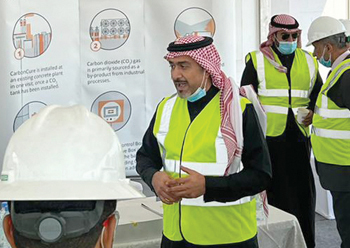Qanbar Ready Mix trials green concrete mix
01 February 2022
Eastern Province-headquartered Qanbar Ready Mix, which has 40 years’ experience in the supply of quality readymix concrete, has taken a pioneering role in Saudi Arabia and the Middle East by conducting the first trial mix of concrete injected with carbon dioxide (CO2) using innovative technology from Canada’s CarbonCure.
The company conducted a full-scale plant trial of the first CO2-injected readymix concrete mix design on December 27 in Ras Al Khair Industrial City in the presence of employees from its customers, Saudi Aramco, and an invited audience of about 100 engineers.
The green concrete will be used at projects in the King Salman International Complex for Maritime Industries and Services which will be supplied from Qanbar Ready Mix’s batching plants located in Ras Al Khair.
 |
|
The carbon dioxide is mixed in a central chamber |
Speaking to Gulf Construction at the launch, Saud Abdul Aziz Al Ansari, Board Member and Managing Director of Qanbar Ready Mix, said: “We are using new technology called CarbonCure, which is a very simple and straightforward technology where we inject CO2, as a liquid form, into the concrete mix. This material bonds with the mix, and provides some additional features. We are the first to launch this technology from North America in Saudi Arabia and the Middle East. This particular technology has been proven a success in North America and Europe as well as elsewhere in the world. So, we’re happy today to launch it and we’re hoping to contribute to a low-carbon society.”
The quantity of carbon emissions that can be saved in this process is enormous, according to Al Ansari.
He elaborated: “CarbonCure technology is estimated to save about 25 kg per cu m produced. So by simple calculation, if we assume that we produce a million cu m of concrete a year, this implies savings of carbon emissions equivalent to about 25,000 tonnes. And we can achieve this target in two ways. Firstly, by using carbon as a natural source, and as an admixture for the concrete, we save carbon emissions. Carbon dioxide injected into the mix enhances its properties and makes it stronger, and therefore we use this as the cement content.
 |
|
Innovative technology from CarbonCure is being used in the process. |
“The second way we save emissions is by reducing cement content – and we all know that cement production involves a lot of carbon emissions. So that’s what we’re aiming for and are receiving support from different authorities. We hope that we can start production on a commercial basis very soon.”
CarbonCure’s technology for the concrete industry introduces recycled CO2 into fresh concrete to reduce its carbon footprint without compromising its quality or performance. Once injected, the CO2 undergoes a chemical reaction and converts into a mineral – calcium carbonate – and becomes permanently embedded, improving the compressive strength of the concrete. This allows concrete suppliers to optimise their mix designs and safely reduce cement content, thus gaining economic and climate benefits, according to CarbonCure.
 |
|
Delegates tour Qanbar Ready Mix’s batching plant. |
The green mix that Qanbar Ready Mix used in the trial comprised 135 kg/cu m of cementitious materials including Ordinary Portland Cement (250 kg/cu m), fly ash (110 kg/cu m) and microsilica, which are mixed with carbon dioxide constituting 0.1 per cent of the cementitious content in a central mixer. The cementitious materials are combined with water (135 kg/cu m), aggregate and admixtures including retarders and superplasticisers (2 kg per cu m, each) and will achieve a compressive strength of 32 MPA at 28 days.
Testing of the product – both on freshly poured and hardened concrete – is being conducted by Arab Company for Laboratories and Soil, as recommended by CarbonCure.
- Qanbar Ready Mix trials green concrete mix
- RFQs issued for water reservoir projects
- DGDA in $1.1bn deal for super basement car park
- Al Yamamah Steel wins major supply contract
- SWPC tenders two sewage plant projects
- PIF to set up green hydrogen plant with Koreans
- KSA is ‘top-performing construction market’
- Minimum project value set for Saudi PPPs
- Iconic palaces to be transformed into luxury hotels
- TRSDC achieves close of $3.76bn loan
- EOIs invited for two medical city projects



